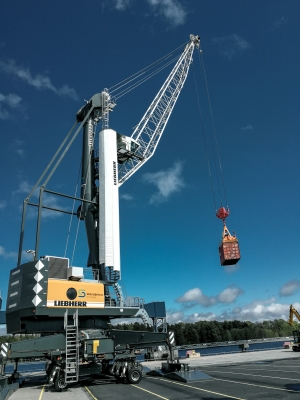


(Posted on 19/05/21)
The Port of Södertälje underlines its efforts to become a Green Port with the acquisition of the first Liebherr mobile harbour crane running on fossil-free HVO100 diesel. The new LHM 420 mobile harbour crane was recently delivered to the port and will significantly improve handling capacity in the container and project cargo sector.
Rostock (Germany), May 2021 – With its proximity to the good infrastructure of Stockholm and its metropolitan area, the Port of Södertälje has a unique location in one of the most expansive regions in Scandinavia.
The Port of Södertälje purchased a new Liebherr mobile harbour crane, type LHM 420 in 2020. The new machine was delivered in March 2021 and is already in operation at the port. With its lifting capacity of up to 124 tonnes and its 360-degree mobility, the crane offers the port flexibility in handling a wide range of goods. In addition, the crane is fully loaded with various assistance systems that make container handling even more effective and safe. Liebherr assistance systems such as the Vertical Line Finder, the Teach-In system or the Advanced Container Control make the crane a partially automated and intelligent crane. In addition, due to the proximity of the port to the city, the LHM noise insulation is installed. “The timing for us to invest in a third mobile harbour crane is perfect. It means that we can offer our customers a more efficient handling and permits continuing growth within the container segment as well as project cargoes”, says Robert Tingvall, CEO at Port of Södertälje, “we have a very modern terminal, focusing on efficiency, automation, and digitisation. We are very pleased and happy about this new crane.”
Besides all the useful and efficiency-enhancing features, the real special characteristic of the new machine for Sweden is its type of fuel. The machine is the first Liebherr mobile harbour crane to run on HVO diesel, which is almost emission-free. HVO Renewable Diesel is a premium fossil free diesel product made of 100% renewable raw materials, which does not release any new carbon dioxide into the atmosphere. It is produced by hydro-treatment of vegetable oils and/or organic fats. The result is a premium quality fuel with a chemical structure almost identical to regular diesel and can therefore fully replace fossil diesel. The Port of Södertälje was the first port in Sweden to convert to fossil-free fuels. Since 2016, the port uses the environmentally beneficial fuel HVO100 to run its vehicles, machinery, and cranes.
Rio Tinto’s first Pilbara-made iron ore rail car has rolled off the production line in Karratha... Read more
Precision meets progress at Phu My Port, Vietnam. The LPS 550 has been deployed to handle bulk commodities... Read more
bound4blue, a global leader in wind propulsion systems, has expanded its industrial footprint in Asia... Read more
As the industry explores multiple decarbonisation pathways, methanol is gaining attention as a practical... Read more
Technology group Wärtsilä will supply an integrated hybrid propulsion system for a bulk carrier... Read more
Superior Industries, Inc., a US-based manufacturer and global supplier of bulk material processing and... Read more
ESL Shipping has taken a significant step forward in digitalisation by deploying a new multichannel... Read more
Condition Monitoring Technologies (CMT) has deepened its presence across Asia’s most influential... Read more
After delivering its first full-scale seagoing project last week, Wattlab signed a contract at Europort... Read more
Steelpaint GmbH has reported strong growth in orders for corrosion protection coatings on Germany&rsquo... Read more